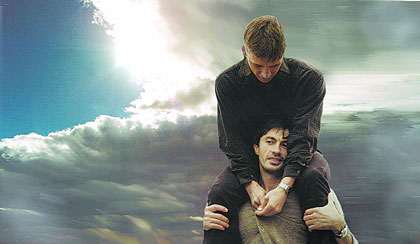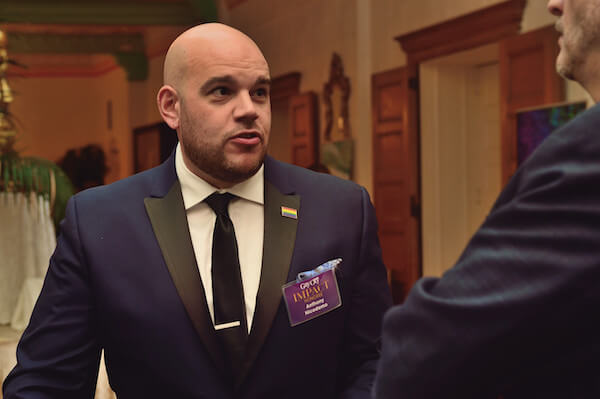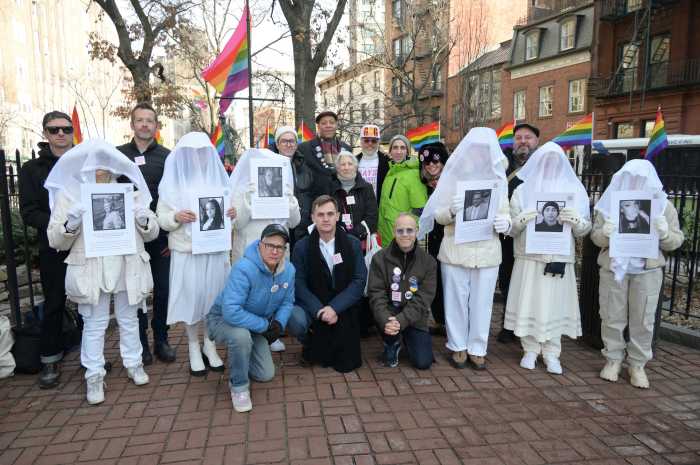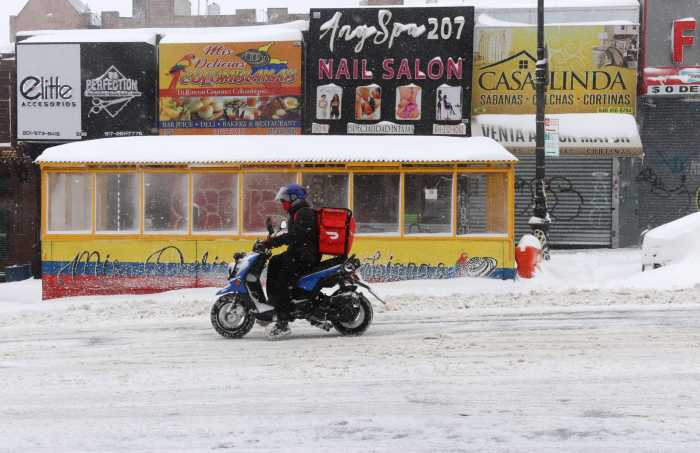Known for stylized cinematography, Russian director takes on father-son bond
“Father and Son” is the most homoerotic straight film to come along since last year’s teen horror opus, “Jeepers Creepers 2.”
The film opens with two men, clad only in their underwear, moaning and groping at each other’s torsos. Surely, this must be a sex scene. No, the men are father and son, not lovers. The father is trying to comfort his son after a nightmare. Nevertheless, the homoeroticism remains prevalent throughout the movie and there’s no question that “Father and Son” is a love story, even if its characters’ sexual desire goes sublimated or unexpressed.
After years of being the token Russian director in competition at Cannes, but rarely getting his work distributed in America, Alexander Sokurov scored a minor art house hit with 2002’s “Russian Ark.” A 95-minute tour through the Hermitage, shot on video in a single take, its conventional elegance—as opposed to the unconventional attraction of most other Sokurov films—undoubtedly helped it win a wider audience. The director has never been much of a storyteller. “Russian Ark” was no exception, although it compensates for a virtually nonexistent narrative by putting two talkative characters, an unseen stand-in for the director and an 18th century French nobleman, at center stage.
In “Father and Son,” a father (Andrey Schetinin) and his son, Alexei (Aleksey Neymyshev), live on the top floor of an apartment building. Having been forced to retire from his air force regiment, the father witnesses his son join a military school, where he shows a particular interest in medicine. (He analyzes an X-ray to determine that his father doesn’t have lung cancer.) Alexei has a girlfriend, but she becomes competition for his father and eventually leaves him. Going home, he hangs out with Sasha (Alexander Razbash), the son of his father’s missing friend, who wants to move in.
Sokurov’s films are generally visually appealing, if larger meanings remain elusive or, at worst, absent. Transported into the medium of film, his borrowings from 19th century painting, most evident in “Mother and Son,” look avant garde. In “Father and Son,” he favors washed-out lighting, pale green, yellow, and orange filters and the occasional use of anamorphic lenses to distort images. Like his mentor, the late Andrei Tarkovsky, he devises some uncanny shades of color. However, while Tarkovsky used his fascination with earth, water and fire to hint at larger spiritual concerns, Sokurov seems concerned more with mythological archetypes than with God.
For a film that places so much emphasis on the military, “Father and Son” is strangely apolitical. The war in which the father fought must have been the Soviet occupation of Afghanistan, yet this is never made clear. There are no references to contemporary culture or politics. Tchaikovsky dominates the soundtrack. Shot in St. Petersburg and Lisbon, the two cities seamlessly blend together. Ultimately, Sokurov’s approach amounts to an evasiveness that suggests that a literal interpretation of the storyline is too reductive.
Sokurov likes making series of films. He’s directed an ongoing string of video elegies. He’s in the midst of a trilogy about 20th century tyrants. “Father and Son” is the second part of a trilogy about family relations. The series began with “Mother and Son,” in 1997, and will conclude with “Two Brothers and a Sister.” “Mother and Son,” which wears its heart on its sleeve, is essentially a feature-length Pieta. In that film, the mother is dying, but the father in “Father and Son” looks about 35 years old, a plausible age since he mentions fathering Alexei at 19. Thus, his relationship with Alexei takes on overtones of rivalry and competition, especially when Sasha enters the picture.
Around the time the Soviet Union collapsed, Sokurov made “The Second Circle,” a metaphorical film about a son’s struggle to bury his father. In the context of Russian history, “Father and Son” feels like an effort to imagine a kinder, gentler patriarchy.
The film is an odd, not fully integrated mix of dreamlike atmospherics, vulnerability, and machismo. The final scene shows the father on a snowy rooftop with his shirt off. Alexei delights in hanging above the ground on a flimsy board. The father watches boxing exercises at his school. Yet there’s nothing conventionally macho about their emotional expressiveness.
Their physical closeness may be culturally Russian, but such physical intimacy between males is rare in the U.S. Women are nonexistent in this film, or portrayed as a threat to the father and son’s bond.
“Father and Son” takes its masculine solemnity to the point of kitsch, although Sokurov’s sensibility is too austere for camp. It has the courage of its convictions, strange as they may seem. For all Sokurov’s denial about his film’s subtext, most gay American indie directors could learn a lot from his poetic visual style and depiction of emotional tenderness between men.





































